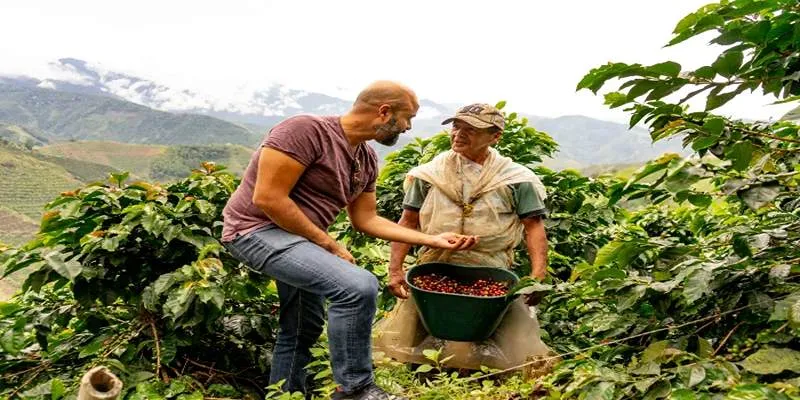Colombian Coffee: A Revolution Brews
Introduction
If you’re searching for the best coffee, Colombian coffee stands unrivaled. With its smooth, rich taste, it has captivated coffee enthusiasts worldwide. But what makes Colombian coffee so exceptional? This guide delves into Colombia’s coffee culture, from its ideal growing conditions to the meticulous gathering process.
Beyond its taste, Colombian coffee represents the culture and dedication of millions of farmers. Each cup tells a story of hard work and innovation. Let’s explore what makes Colombian coffee distinguished on the global stage.
The Unique Geography of Colombia
Colombia’s geography plays a pivotal role in the excellence of its coffee. Rich volcanic soils, high elevations, and a tropical climate characterize the Coffee Belt, located near the equator and ideal for coffee cultivation. In these conditions, Arabica coffee beans, known for their lightness and fragrance, flourish.
The Andes Mountains are essential for Colombian coffee production. The mountainous terrain enables farmers to cultivate coffee at elevations between 1,200 and 2,000 meters above sea level. Higher altitudes contribute to complex aromas and acidity, giving Colombian coffee its distinctive taste.
Diverse microclimates across the country impart unique qualities to the coffee. Northern beans tend to be nutty and chocolatey, while southern beans are fruitier and more aromatic. This variety allows coffee lovers to explore a range of flavors in Colombian coffee.
Why Colombian Coffee is Considered the Best
Ideal Growing Conditions
Colombian coffee owes its superior quality to the nation’s natural conditions. Volcanic soil provides essential nutrients, while consistent rainfall ensures proper bean development. The slow growth at high altitudes allows beans to develop distinctive flavors.
Hand-Picked Perfection

One of the most remarkable aspects of Colombian coffee production is the hand- picking process. Unlike mechanical harvesting, which often collects unripe or overripe cherries, Colombian farmers carefully select only the ripest cherries. This meticulous approach enhances the flavor and consistency of the final product.
Commitment to Arabica Beans
Colombia exclusively cultivates Arabica coffee beans , renowned for their superior taste compared to Robusta beans. Arabica beans are less bitter and exhibit a complex flavor profile with hints of sweetness and acidity. This commitment to quality over quantity is a defining characteristic of Colombian coffee.
The Role of Coffee in Colombia’s Economy
Coffee is vital to Colombia’s economy, supporting over 500,000 families directly involved in coffee farming. It significantly contributes to the country’s GDP and serves as a primary income source for rural communities.
The Colombian Coffee Federation (FNC) has been instrumental in ensuring the industry’s sustainability and success. The FNC provides farmers with training, resources, and access to global markets, helping them compete in the international coffee trade. Thanks to these efforts, Colombian coffee maintains its reputation as one of the finest in the world.
Coffee farming also fosters a sense of community among farmers. Cooperatives and associations unite farmers to share resources, exchange knowledge, and collectively market their coffee. This collaborative spirit strengthens the industry and ensures its resilience in facing challenges.
The Coffee Culture of Colombia
In Colombia, coffee is more than just a beverage; it’s an integral part of the country’s culture and daily life. Colombians often begin their day with “tinto,” a small, strong cup of black coffee that serves as a simple yet satisfying pick-me-up.
Cafés and coffee shops across Colombia celebrate the nation’s deep-rooted coffee culture. Many of these establishments offer traditional brewing methods, allowing visitors to experience the authentic taste of Colombian coffee.
“Coffee tours” have grown in popularity among visitors. These tours take visitors to coffee farms, where they can witness the entire journey of coffee—from planting and harvesting to roasting and brewing. These immersive experiences provide a deeper appreciation for the effort and artistry behind every cup.
Sustainability in Colombian Coffee Production
As global demand for coffee grows, sustainability has become a critical focus for Colombia’s coffee industry. Many farmers are adopting eco-friendly practices to minimize their environmental impact while maintaining the high quality of their coffee.
One such practice is organic farming, which eliminates synthetic fertilizers and pesticides. Instead, farmers rely on natural methods to nurture their crops and protect the ecosystem. Water conservation is another priority, with many farms implementing systems to reduce water usage during processing.
Organizations and cooperatives work closely with farmers to promote sustainable practices and provide certifications such as Fair Trade and Rainforest Alliance. These certifications assure consumers that their coffee is ethically sourced and environmentally friendly.
How to Enjoy Colombian Coffee at Its Best

Grind and Brew Fresh
To fully enjoy the flavors of Colombian coffee, use freshly ground beans. Grinding coffee before brewing helps preserve its aroma and taste, ensuring a richer experience.
Experiment with Brewing Methods
Different brewing techniques bring out different aspects of coffee’s flavor. Whether you prefer a French press’s simplicity or a pour-over’s precision, experimenting with methods can help you discover your favorite way to enjoy Colombian coffee.
Proper Storage Matters
Store coffee beans in an airtight container, away from heat, light, and moisture. Proper storage helps maintain the beans’ freshness and flavor for longer.
The Global Impact of Colombian Coffee
The influence of Colombian coffee extends far beyond its borders. It has become a global ambassador for Colombia, showcasing the country’s rich agricultural heritage and commitment to excellence. Colombian coffee has won numerous awards and is a favorite among consumers worldwide.
Moreover, the industry’s emphasis on sustainability and ethical practices sets an example for coffee producers around the globe. By prioritizing quality, fairness, and environmental responsibility, Colombia has cemented its position as a coffee world leader.
Conclusion
Colombian coffee represents heritage, quality, and devotion. From the lush Andes soils to the painstaking hand-picking, every cup tells a narrative of commitment and artistry. This coffee delivers an unforgettable experience, whether drinking it at home or in Colombia’s vibrant coffee culture. Colombian coffee leads the way in quality and sustainability. Next time you brew Colombian coffee, savor its journey—a journey that embodies Colombia’s heart and soul.